Related Research Articles

In popular music, a cover version, cover song, remake, revival, or simply cover is a new performance or recording by a musician other than the original performer or composer of the song. Originally, it referred to a version of a song released around the same time as the original in order to compete with it. Now, it refers to any subsequent version performed after the original.
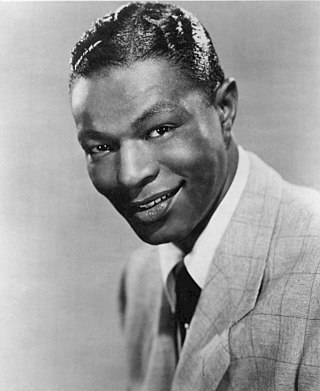
Nathaniel Adams Coles, known professionally as Nat King Cole, alternatively billed as Nat "King" Cole, was an American singer, jazz pianist, and actor. Cole's career as a jazz and pop vocalist started in the late 1930s and spanned almost three decades where he found success and recorded over 100 songs that became hits on the pop charts.

Natalie Maria Cole was an American singer, songwriter, and actress. She was the daughter of singer and jazz pianist Nat King Cole. She rose to prominence in the mid-1970s, with the release of her debut album Inseparable (1975), along with the song "This Will Be ", and the album's title track. Its success led to her receiving the Grammy Award for Best New Artist at the 18th Annual Grammy Awards, for which she became the first African-American recipient as well as the first R&B act to win the award. The singles "Sophisticated Lady" (1976), "I've Got Love on My Mind", and "Our Love" (1977) followed.

John Royce Mathis is an American singer. He is one of the best-selling recording artists of the 20th century. Starting his career with singles of standard music, Mathis became highly popular as an album artist, with several of his albums achieving gold or platinum status and 73 making the Billboard charts.
Gordon Hill Jenkins was an American arranger, composer, and pianist who was influential in popular music in the 1940s and 1950s. Jenkins worked with The Andrews Sisters, Johnny Cash, The Weavers, Frank Sinatra, Louis Armstrong, Judy Garland, Nat King Cole, Billie Holiday, Harry Nilsson, Peggy Lee and Ella Fitzgerald.

"Ramblin' Rose" is a 1962 popular torch song written by brothers Noel Sherman (words) and Joe Sherman (music) and popularized by Nat King Cole. The recording by Nat King Cole reached No. 2 on the Billboard Hot 100 chart in 1962.

Mark Howe Murphy was an American jazz singer based at various times in New York City, Los Angeles, London, and San Francisco. He recorded 51 albums under his own name during his lifetime and was principally known for his innovative vocal improvisations. He was the recipient of the 1996, 1997, 2000, and 2001 Down Beat magazine readers' jazz poll for Best Male Vocalist and was also nominated five times for the Grammy Award for Best Vocal Jazz Performance. He wrote lyrics to the jazz tunes "Stolen Moments" and "Red Clay".
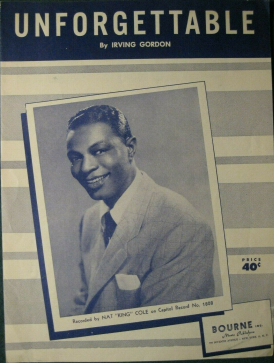
"Unforgettable" is a popular song written by Irving Gordon. The song's original working title was "Uncomparable", however, the music publishing company asked Gordon to change it to "Unforgettable". The song was published in 1951.
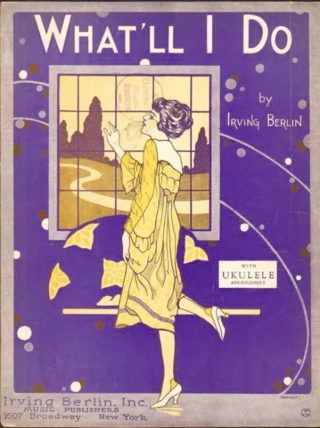
"What'll I Do" is a song written by Irving Berlin in 1923. It was introduced by singers Grace Moore and John Steel late in the run of Berlin's third Music Box Revue and was also included in the following year's edition.
"I Had the Craziest Dream" is a popular song which was published in 1942. The music was written by Harry Warren, the lyrics by Mack Gordon.
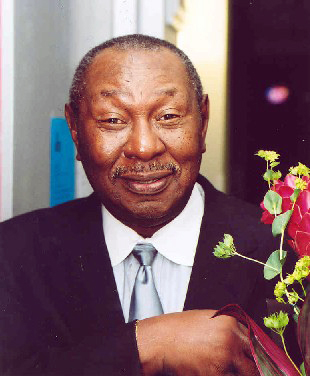
Lionel Frederick Cole was an American jazz singer and pianist whose recording career spanned almost 70 years. He was the brother of musicians Nat King Cole, Eddie Cole, and Ike Cole, father of Lionel Cole, and uncle of Natalie Cole and Carole Cole.
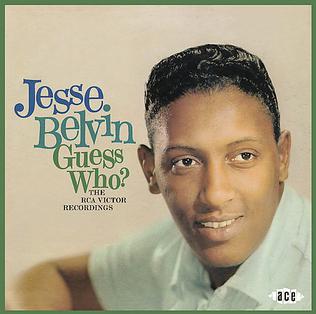
Jesse Lorenzo Belvin was an American singer, pianist and songwriter popular in the 1950s. Belvin co-wrote the 1954 Penguins' doo-wop classic "Earth Angel", which sold more than 10 million copies, while his top recording was the 1956 single "Goodnight My Love", a song that reached No. 7 on Billboard's R&B chart.
"A Cottage for Sale" is a popular song. The music was composed by Willard Robison, and the lyrics were written by Larry Conley. The song was first published in 1929, and over 100 performers have recorded versions of "A Cottage for Sale." The first versions of the song were released by The Revelers in January 1930 and Bernie Cummins with the New Yorker Orchestra in March 1930.
"Mona Lisa" is a popular song written by Ray Evans and Jay Livingston for the Paramount Pictures film Captain Carey, U.S.A. (1949), in which it was performed by Sergio de Karlo and a recurrent accordion motif. The title and lyrics refer to the renaissance portrait Mona Lisa painted by Leonardo da Vinci. The song won the Academy Award for Best Original Song in 1950.

Robert William Haymes, also known by the stage names Robert Stanton and Bob Stanton, was an American singer, songwriter, actor and radio and television presenter. He is best remembered for co-writing the song "That's All", part of the Great American Songbook. He was the younger brother of singer and actor Dick Haymes.

This Is Love is an album by American pop singer Johnny Mathis, released by Mercury Records on September 18, 1964. The album includes three covers of Nat King Cole recordings as well as two more songs from "Fly Me to the Moon" composer Bart Howard.

Unforgettable – A Musical Tribute to Nat King Cole is a soundtrack album released in the UK in 1983 by the CBS Records division of Columbia in conjunction with the broadcast of American pop singer Johnny Mathis's BBC television concert special of the same name that featured Cole's daughter Natalie. The front of the original album jacket credits the concert performers as "Johnny Mathis and Natalie Cole", whereas the CD booklet reads, "Johnny Mathis with special guest Natalie Cole".

Johnny Mathis: Wonderful, Wonderful! is a television concert by American pop singer Johnny Mathis that was recorded on October 27, 2006, at the Tropicana Hotel in Atlantic City and aired that December on most PBS stations. In addition to singing some of his biggest hits, he covers tracks from his live albums, songs from Brazil, and two exclusives that have never appeared on a Mathis album. Interview clips with Mathis were inserted at intervals throughout the concert along with live performance excerpts from programs such as The Tonight Show Starring Johnny Carson and The Andy Williams Show.
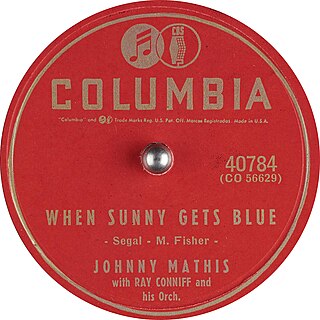
"When Sunny Gets Blue" is a song written by Marvin Fisher (music) and Jack Segal (lyrics), which has become a jazz standard. The song was originally recorded in September 1956 by Johnny Mathis backed by Ray Conniff and his Orchestra, released in February 1957 as the B-side of Mathis's debut single "Wonderful! Wonderful!". The song was included on the compilation album Johnny's Greatest Hits, released in April 1958. The album was a smash hit, staying on the Billboard pop chart for 490 weeks, including 3 weeks at number 1, and 57 weeks in the Top Ten.
"Send for Me" is a song written by Ollie Jones and performed by Nat King Cole featuring the McCoy's Boys. It reached No. 1 on the U.S. R&B chart and No. 6 on the U.S. pop chart in 1957. The song was arranged by Billy May.
References
- ↑ "Part 5A: Published Music". Catalog of Copyright Entries: Third series (Vol 10 ed.). Washington D.C.: Copyright Office, Library of Congress. 1957. p. 705.
- ↑ LIFE - 23 Dec 1957 - Page 3 LONG PLAY BEST SELLING ALBUMS NAT 'KING' COLE Here is the man whose warm, ... Twelve favorites including: Annabelle, Dreams Can Tell a Lie, Never let Me Go, To the Ends of the Earth, Too Young to Go ..."
- ↑ John Swenson The Rolling Stone jazz & blues album guide 1999 - Page 159 "To the Ends of the Earth (Fantasy, 1997) Freddy Cole fb. 1931), the younger brother of Nat King Cole, has an instantly recognizable voice full of charm and emotional heft."